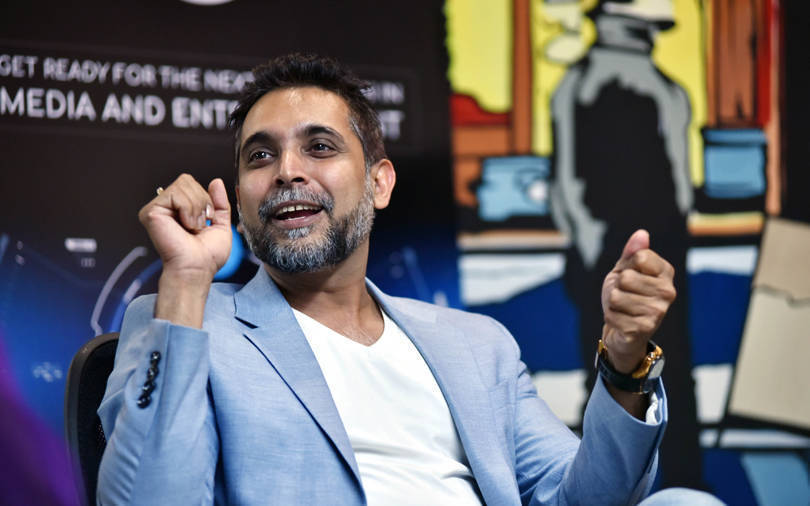
Anthill Ventures founder Prasad Vanga on creating a 'speed scaling' model for startups


 Prasad Vanga, founder of early-stage investment firm Anthill Ventures, wants to bring together companies which have substantial business expertise and agile startups looking to grow quickly. For this purpose, Anthill Ventures is relying on its ‘speed scaling’ model and a bi-annual programme for startups in the pre-Series A stage.
Prasad Vanga, founder of early-stage investment firm Anthill Ventures, wants to bring together companies which have substantial business expertise and agile startups looking to grow quickly. For this purpose, Anthill Ventures is relying on its ‘speed scaling’ model and a bi-annual programme for startups in the pre-Series A stage.
The firm, which is raising a $100 million fund, invests in startups in three sectors: healthtech, media and entertainment, and urban technology.
The firm has offices in Hyderabad to mentor Indian companies and in Mauritius to lead its global investments. In an interaction with TechCircle, Prasad says it pays to check the scalability of a startup before making an investment. He also talks about Anthill's "scalability quotient" and exit strategy. Excerpts:

What makes Anthill Ventures different from other startup incubators and accelerators?
We don’t call ourselves an accelerator, but a speed-scaling ecosystem. We use this terminology because typical incubators and accelerators are very early stage. We only invest in companies which are part of our programme.
When we invite applications, typically, 300 to 500 startups apply and we select about 10. It is not that all others are rejected; we might not have technology to help them scale.

As of now we are trying to do two programmes a year in each vertical. Each programme has nine to 10 startups. They get support for a year and we give them about $500,000 worth of credits, infrastructure credits, capital, mentoring, all put together.
At what stage do you evaluate companies?
Mostly, we invest in the pre-Series A stage. In rare cases, we also invest in companies which are in much later stage. We are now closing a deal with a company which has been in existence for 50 years and we are revamping their digital side.

Also, if you have strong intellectual property, that is also very exciting for us and we can go earlier than pre-Series A.
How do you evaluate startups for the programme?
We have a ‘scalability quotient’, which is a set of 100-plus parameters. It measures the scalability of a company based on ratings given by mentors and experts. Based on this, the company goes to the next stage.

These parameters include questions like whether the founder has knowledge of the sector, differentiators from others in the space and quality of investors coming in the round.
The scalability quotient is applied to any startup which applies for our programme. It actually showcases where a company is weak or strong and gives us an idea on where to focus to bring the company up-to-speed over the next year. Our vision for the scalability quotient is to make it an industry standard for evaluating companies.
Which are the sectors Anthill Ventures is focussed on?

We started in January 2015. The intent was to help companies scale up with speed. Scale and speed are important for organisations--whether startups or larger companies-- to survive today.
We got attention from larger companies like YES Bank, Qualcomm, Novartis and others. The larger companies look at it as an outsourced R&D for them to become agile and gain market share. Smaller startups were attracted because larger companies were giving them market access.
Our philosophy was to raise a fund to invest in companies which have very high scalability in three sectors: Anthill Studios, which is our media and entertainment programme; Lumos Health, where we have partnered with HealthCare Global (HCG); and the soon-to-launch, urban-tech.

Anthill Studios solve for use cases in media. It could be artificial intelligence for script analysis or understanding consumer behaviour for over-the-top (OTT) audience.
Lumos Health is focussed on companies in oncology, fertility, home health and Internet of Things for health. Urban-tech will focus on smart living infrastructure.
What is the fund size and who are your limited partners (LPs)?
There are three kinds of LPs on board. One, larger companies which are looking to tap into the startups to be agile. Two, traditional family offices, which want to get into a new area of investment. Three, senior executives of large companies who have expertise to scale a business.
The total fund size is $100 million. It is a rolling fund, meaning that we do not need the entire capital at one go. Between India and Mauritius we have $15 million committed. As and when required, we keep raising capital.
How does the exit scenario look for your portfolio companies?
Our portfolio has 25 companies. We have invested in an electric car maker in Sweden, a crop-cloning company in Denver and a wedding marketplace in India.
We have shown 70% success rate and 400% increase in portfolio value and are now on the verge of three exits. Our investors then asked us to channelise our energies into high-potential technology. This way the mentors and corporates are focussed and mature.
Typically, in venture capital, 20% of the portfolio makes up for 80% of the losses. It is important to create liquidity but not give the investor a promise on timeline. We will show exits to our investors in the third or fourth years.
This interview is part of our InvestorSpeak series in which leading angel, seed or venture investors share their insights on the startup ecosystem in India.
